#professor nemuro
Text

Just one more and it's like we can commit arson on an elevator building twice
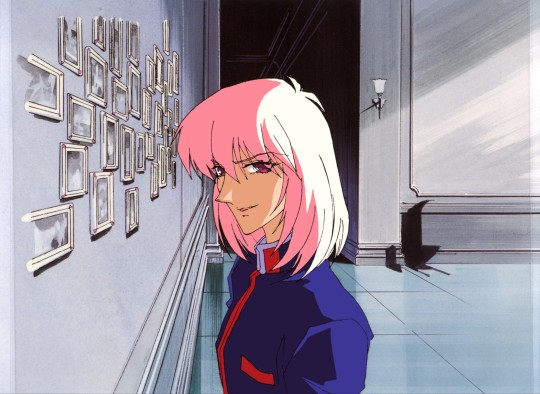
160 notes
·
View notes
Text

(the monster is in the mirror)
[original comic by @asoftersea]
#a softer world#revolutionary girl utena#shoujo kakumei utena#a softer world remix#rguedit#souji mikage#mamiya chida#mikage and mamiya#a softer sea remix#7 2023#professor nemuro
91 notes
·
View notes
Text

01x23 qualifications of a duelist
#utena#revolutionary girl utena#rgu#shoujo kakumei utena#sku#souji mikage#mikage souji#professor nemuro
12 notes
·
View notes
Text
I’ve posted this before, but if any of y’all like Souji as much as I, I think you’ll like this playlist. It’s a chronological playlist that follows the progression of his character
6 notes
·
View notes
Text
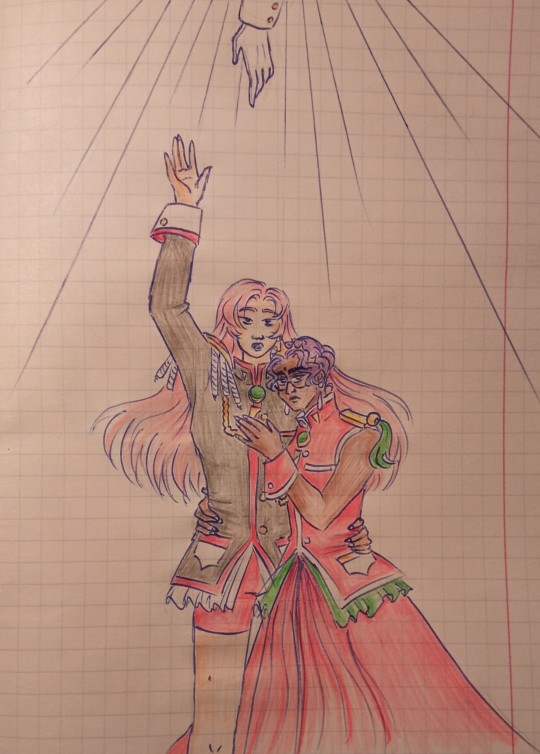

I knew since the first time I saw you.
You met the person important to you long ago, right?
And so, that person changed your life forever, right?
After all, you're just like me.
I had to draw this cause the parallels between Dios/Utena/Anthy and Tokiko/Mikage/Mamiya wouldn't let me sleep in peace
#utenadoodles#utena tenjou#anthy himemiya#dios#souji mikage#professor nemuro#mamiya chida#tokiko chida#help I am once again having ideas beyond my skill level#well I tried my best
9 notes
·
View notes
Text

an insight into the mind of one mikage souji/professor nemuro
#shoujo kakumei utena#revolutionary girl utena#mikage souji#souji mikage#i spent like 20 minutes on this please laugh
109 notes
·
View notes
Text
Mikage: Boy of the Black Rose
I've long struggled to write about Mikage, who I find to be an intriguing yet elusive character. or rather, his character is understandable--his motives and feelings are communicated clearly enough--but his narrative is one of the most inexplicable in RGU. thinking it over tonight, I put my finger on one aspect of the Black Rose arc which I previously didn't know how to approach: specifically, Mikage's relationship with the Boys of the Black Rose.
the boys act as a kind of collective character, a mass of faceless people who whisper in dark corners. since RGU is about social reality, it often uses extras to deliver exposition or set the mood. the Shadow Girls are meta characters, existing somewhat outside the narrative, but regular schoolgirls at Ohtori can serve a similar purpose. they might demonstrate that Touga and Saionji are considered the hottest boys in school, or gossip about Ruka and Shiori's recent breakup.
the Boys of the Black Rose are slightly different, maybe a little closer to the Shadow Girls. rather than acting as bit characters in the larger world of Ohtori campus, I believe their existence is contigent on Mikage. while this could be put in various ways, in the most straightforward terms, the writers created them to help reflect on Mikage's character.
only one Black Rose Boy is given a face: the first one Mikage (Nemuro) talks to. when Mikage asks not to be called "professor," since they are the same age, the boy replies:
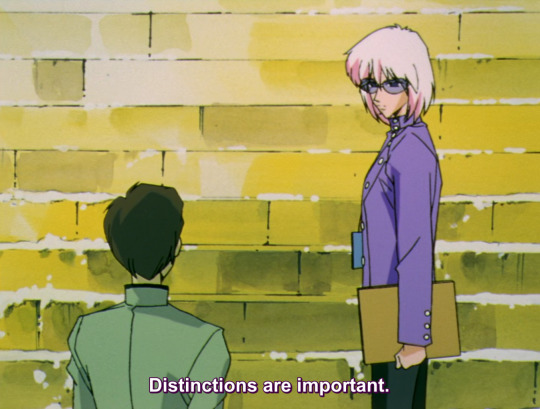
obviously, RGU relies on making its main characters visually distinct from "normal people." Wakaba calls them "special" and resents them. Utena is popular for her specialness, well-liked; in contrast, Mikage is an outcast for his. for a person to be special or a genius, there must be others for them to stand in opposition to. Mikage is set apart from his peers by his pink hair, by his unique uniform, and by being a professor.
after Mikage is introduced to his new work, the boys begin to gossip about him, saying he knows nothing about what's really going on at Ohtori. towards the end of this conversation, there's a shot of Mikage, and then he actually replies from the future to the gossip they were spreading about him.
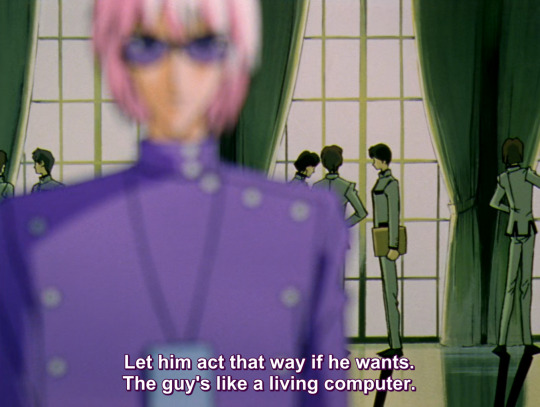
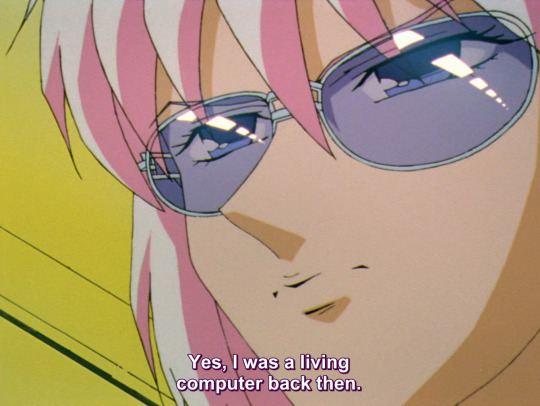
this is Mikage's eternal reality: his recollection of the past. even during the "present" of Utena's narrative, he is still walking through Nemuro Memorial Hall, which is why it's still standing, unburned. the Boys of the Black Rose that the audience sees are filtered through Mikage's memory; whether or not the boys really said these things about him is ambigous. it's possible, but the important fact is that Mikage believes they did.
this transpersonal mirroring keeps Mikage trapped, unchanging. he feels himself defined as unable to connect with others, so he keeps away from them. this becomes a self-perpetuating cycle, leaving Mikage a total outcast.
even outcasts, however, are members of society. the Boys of the Black Rose actually have more in common with Mikage than the average Ohtori student. they're all scientists working on the same project. they have much of his coldness, sense of superiority, and intellectualism. the main difference is that they're the in-group.
while Mikage believes himself to be emotionless, it's made clear that his social isolation hurts him. he doesn't want to be set apart, but he doesn't know how to break through the barrier between him and others. it's very easy to do a queer reading of the character, given the way this is conveyed to the audience.
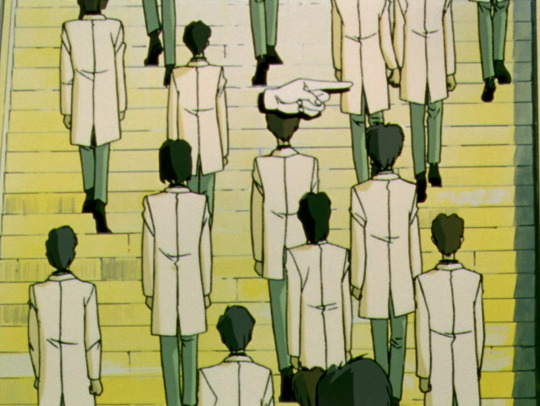
Mikage's fixation on Tokiko and Mamiya is easier to undestand with all this in mind. the world he was living in, occupied by the Boys of the Black Rose, was a cold and alienated one. in contrast, Tokiko has genuine passion, caring for her brother deeply. Tokiko's tears move Mikage, allowing his own buried emotions to break through the surface. but she also reinforces his social isolation; he is equally as hurt by her as he is drawn to her.
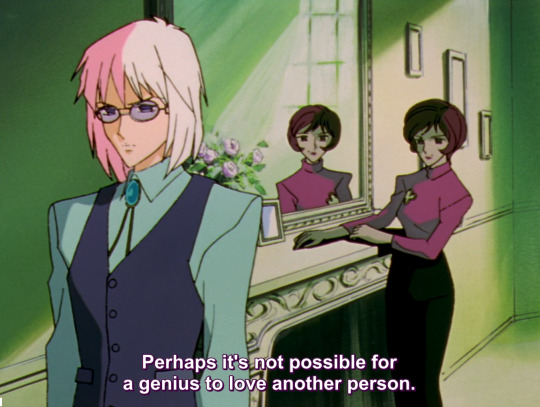
this is part of why Mikage is so determined to "defeat" Tokiko; she offered him hope of connection, but he was never able to "win" her, as men so often try to do with women.
Mamiya is something else altogether; a boy, like Mikage and the Black Rose Boys, but altogether different. warm, friendly to Mikage, not intimidated by his intelligence or reputation, and insightful. in a show full of characters obsessed with holding on (to the past, to a person, to their self-image), Mamiya is the only one who can see the wisdom in letting go.
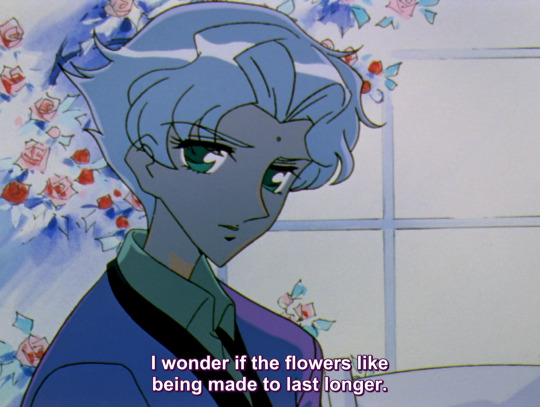
Mikage at first is open to Mamiya's words, preparing to call off their quest for eternal life. but like every character who threatens the system in RGU, he is faced with Akio. in a prototype of the later "End of the World" sequences, Mikage comes across the kissing Tokiko and Akio. this proves to be too much for him; there are some things he can't afford to lose.
the scene has significance to Mikage far beyond disappointment in love. he wanted to create a family with Tokiko and Mamiya; marriage to Tokiko would tie them together "forever." if he could be by Tokiko's side as they lost Mamiya, then at least he wouldn't be alone after his death. but if he's only Tokiko's coworker, when their work is done, he's back to being a computer.
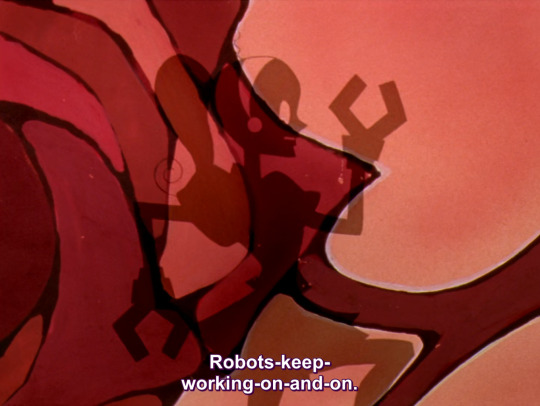
in desperation, Mikage plays into Akio's hands. under contract, he sacrifices the Boys of the Black Rose and burns down the hall that bears his name. when justifying himself to Tokiko, he claims that this act will allow them to attain eternity. in the events of the series, he's still at it: installing Mamiya as the Rose Bride will, after all, make him eternal, even though it's the very kind of eternity Mamiya wanted nothing to do with.
Mikage retreats into delusions on feeling the sting of Tokiko's rejection. though he is the one who betrayed her, he turns it around and feels betrayed himself. going even further, he casts Mamiya as the one who set the fire.
the Boys of the Black Rose are also used to emphasize his inability to face his own actions. throughout the arc, the boys are seen pushing coffins around. however, in episode 23, Mikage takes their place right before he is forced to face the truth about himself.
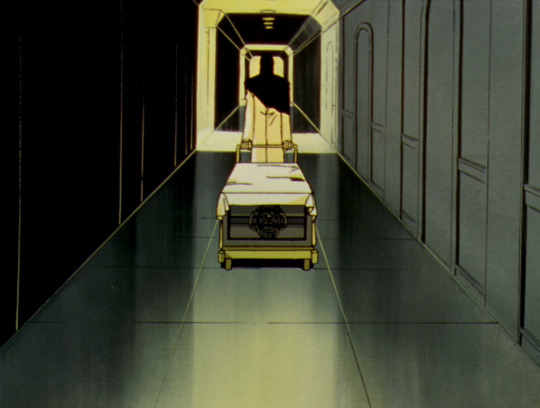
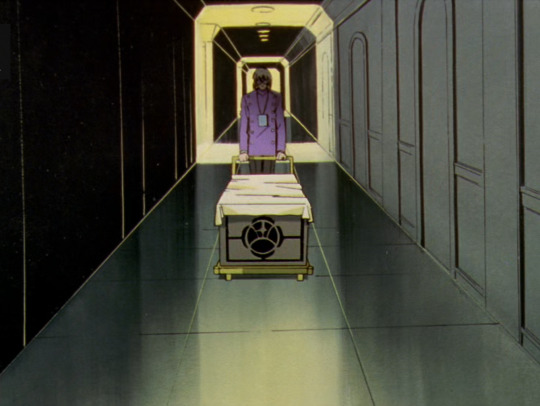
at the end of the arc, Miki claims that no one was hurt in the the fire, contradicting the previous story of Nemuro Memorial Hall. this possibly indicates that the murders are a figment of Mikage's imagination--the older Tokiko doesn't seem to react to him as if he's a murderer. more than anything, he seems guilty of self-denial and retreat from reality. Tokiko went on to accept Mamiya's death and even mourned for Mikage, while he ignored her in favor of his memories. the fact that he does not recognize her feelings is another aspect of his tragedy.
Mikage, through his fruitless revolution, loses the very things he always wanted. he attempts to throw away his past self, the cocoon of Nemuro hatching into the butterfly that is Mikage. with it, he burns away the boys who rejected him, who embodied the cold world he used to live in. he uses their sacrifice to enshrine Mamiya, idealizing him as the perfect companion. but as Ikuhara said, he was doomed to fail from the start:
Those who reject that place are, conversely, rejected by it as well. This is the nature of systems: the moment you reject them, you are forced to realize that they’re the very ground you’re standing on. Mikage noticed the trick behind the system, and he hurriedly attempted revisions. But the adult who’d created the system just said “Let’s not,” and unilaterally brought the curtain down.
the "trick within the system," is, I think, the fact that it's socially constructed. Mikage believed that on realizing this, he could simply remake the world as he wanted. he was allowed to do so for a time, when it was useful. when he ceased to be useful, he was dispatched with, because while he had operated within the system, he was not in control of it. and beneath his delusions, there was still a reality.
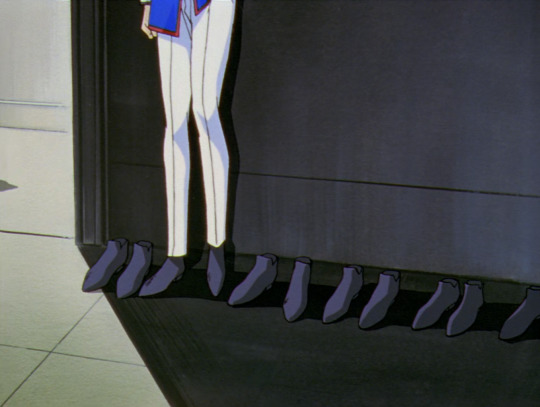
Mikage is the true Boy of the Black Rose: the true ghost, the true sacrifice, living in the desiccated world of a preserved flower. throughout the arc, he takes possession of Ohtori students who suffer from the same afflictions as him, and every time Utena defeats one of his duelists, another part of him is exorcised--another Black Rose Boy burned away. in the end, the only thing left of him is the ruin of Nemuro Memorial Hall, shown briefly in the final episode. he graduates at Ohtori, but only after losing absolutely everything. that seems to be the only way to step into adulthood: naked and shivering, like the day we are born.
122 notes
·
View notes
Text
The final series of the arch about the black rose are like a kaleidoscope - bright multicolored pictures are formed first by one pattern, then by another, and it seems that something unites them, but it's hard to say what exactly... The change of colors in Professor Nemuro's past is also fascinating.
Mikage's past begins with a light pastel palette, with the appearance of Tokiko, a yellow color appears, as she approaches the meeting with her brother, everything turns green, and then turns into blue. Mamiya's garden is different from Anfi's garden - black roses, soft, sad withering and quiet doom. While Mikage is working on the project, everything turns yellow again, but this yellow hurts the eye because of the contrast with the black shadows that are multiplying. This dryness of yellow at some point almost completely sinks into blackness... To catch fire with a red-orange fire set by Nemuro.



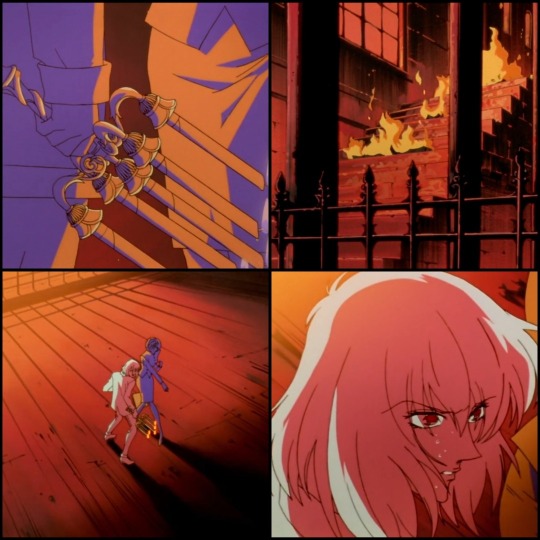
#revolutionary girl utena#utenaposting#shoujo kakumei utena#souji mikage#black rose#my collage#thoughts
101 notes
·
View notes
Note
Please do you know why is he professor nemuro when his name is mikage souji like where does numuro come from?
i'm not actually sure. thematically i think him having two names says something about his sense of identity and how it has changed/been lost over time. there's almost definitely more to it, but i don't have a good enough grasp on his character to really say
#mikage is probably the character i understand the least in the entire show if i'm being honest.#i don't have many coherent thoughts on him beyond his parallels to utena#mikage#asks#m
8 notes
·
View notes
Text
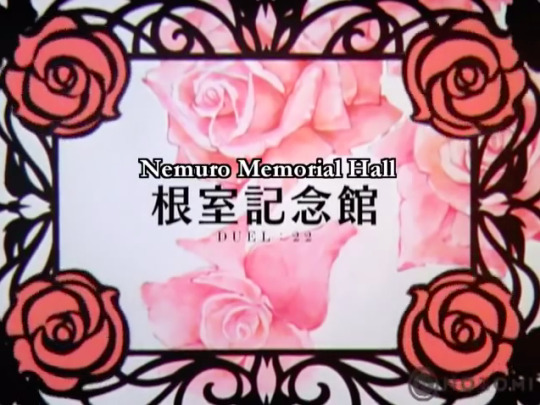
can an hourglass run slow?
the lens widens. souji's looming presence in this arc once again expands the show's scope, and this time in terms of genre. speculative fiction now joins fantasy, romance, and coming of age in the blend of tones: can science achieve the eternal? is it like a perpetual motion machine? or is it like a computer learning to love?
while the student council members try to investigate the black rose duelists, souji receives a letter-bearing visitor: akio, who seems to be the chief agent of end of the world, if not end of the world himself. he brings new orders for souji, who initially resists but finds himself recalling his past as professor nemuro.
in the distant past, ohtori academy seemed to be funding a project with the rumored goal of "revolutionizing the world" or "achieving eternity." to this end, 100 male academics were gathered, along with nemuro, a renowned scholar known as the "living computer." the academics seem to have a sense of a deeper purpose that they withhold from nemuro, though he remains skeptical of the entire affair and sees it as nothing more than a job. as with everything at this school, it's hard to tell who's truly informed and whose intent is being carried out. given the eventual fate of the laboratory, i have to wonder if the academics were gathered specifically because they were young and willing to pursue something as lofty as world revolution: wearing rose crest rings, they seem like prototypes of the student council duelists, wielding scientific instruments and equations rather than swords in their pursue of the eternal.
nemuro stands to the side of this quest, "a dry man living dry days," yet the arrival of tokiko chida and her brother mamiya stirs him from his apathy. chida's essence is one of prolonging and preservation: her over-steeped tea, her butterfly shadowbox(!), her candied flowers, and of course, her ailing brother. computer-like, nemuro notices the details of her home as if being notified by a blinking cursor, another instance of the show using effects and visuals to delineate a character's memories. seeing the tension between tokiko and mamiya, nemuro finds himself unusually emotionally affected. they both care for the roses in the garden, but to different ends; mamiya seems to honor the natural life cycle, wondering "if the roses like to be preserved," while tokiko does everything she can to elongate the moment.
as such, she reveals her reason for coming to the school: she hopes that the project will be successful and provide her a means of preserving mamiya's life. nemuro cautions her that the project wouldn't be able to cure him, and she responds simply by asking if there's anyone he cares for. "perhaps it's impossible for a computer to love someone." nemuro seems to agree, but something has changed within him. he finds a passion for his work, perhaps for the first time in his life, and yet he eventually reaches a wall, an insoluble equation. what can a computer do in the face of such an obstacle?
his only option is to revolutionize the world.
akio appears, counseling nemuro much as nemuro himself will counsel duelist candidates years from now. the path he must take has been prepared for him, though it costs too dearly. nemuro refuses, but having caught a glimpse of his next stage, he wanders the halls in pursuit of it and finds only akio and tokiko in each other's arms. the sequence echoes miki's discovery of touga and kozue, drawing a line between end of the world and touga, the erstwhile inheritor. having lost the object of his affections, nemuro accepts his contract, donning the ring. mysteriously, mamiya is the one to burn down the lab, though i assume nemuro enlisted his help somehow. another connection emerges here as nemuro compares the deaths to fossil fuels, a theme often prevalent in the duel songs' lyrics, which discuss ancient beings and geological eras. the present depends on the past.
emerging from his reverie, souji leaves his office with newfound purpose. his path crosses with tokiko, who has grown older and muses "it breaks my heart to see you like this now" as he passes by. she visits akio, noting that neither of them seem to have aged since she first came to the school, and akio acknowledges that "as long as they remain in these gardens called schools, people will never become adults." on the night the lab burned, nemuro and tokiko reversed roles: the building was reconstructed exactly as nemuro memorial hall and became the epicenter of nemuro's quest to preserve mamiya's life as the rose bride, while tokiko left the school, married, and returns now only to pay her respects at her brother's grave. what does this mean for the mamiya in the present? did he die and become resurrected? or does tokiko see his life now as merely a pale imitation of their time together, and the brother she knew is dead to her? and does souji see mamiya as his only means of preserving and expressing his love for tokiko? or has he come to transfer his feelings for her onto her brother?
yet again, the school is equated to a limbo state, both purgatory and edenic garden, endlessly cycling into the future ordained by end of the world. i notice now that while akio seems more adult than the main cast, he's also only engaged - tokiko being married symbolically marks her as having fully moved on from school life and into adulthood. and yet, she returns to his arms. her words and those of her brother echo here:
"for a plant to bear fruit, its flowers must die."
"nothing in this world is eternal, but a heart that longs for eternity can be considered beautiful."
stray thoughts:
this episode marks the first meeting between souji and utena, oddly inauspicious as it may be. kind of him to save chu-chu from a mousetrap, at least. his invitation to the seminar is intriguing and recalls akio's words about people with special destinies - does he wonder if he could turn utena herself into a duelist against anthy?
"i like when you give me an injection" - no siblings in this show have a normal relationship.
souji links utena & anthy and tokiko & mamiya in his mind: the former trying to instill the latter with a sense of self-worth and preservation, though the situations are markedly different.
the silhouettes discuss the construction of an all-powerful robot, ostensibly representing nemuro: never gets tired, never gets lonely, great at catching monkeys (as proven via chu-chu!).
12 notes
·
View notes
Text

#utena tenjou#nanami kiryuu#juri arisugawa#wakaba shinohara#kyouichi saionji#professor nemuro#souji mikage#revolutionary girl utena#rgu#rgu merch#shojo kakumei utena#utena merch#sku#shoujo kakumei utena#stickers
79 notes
·
View notes
Text

(Take control.)
happy birthday, mikage.
#a softer world#revolutionary girl utena#shoujo kakumei utena#a softer world remix#rguedit#professor nemuro#souji mikage#asw 733#12 2022
76 notes
·
View notes
Text

every human exigency crackles as he plugs it in
every outlet works but one
death stays dark
53 notes
·
View notes
Text

01x22 nemuro memorial hall
#utena#revolutionary girl utena#rgu#shoujo kakumei utena#sku#mikage#souji mikage#mikage souji#nemuro#professor nemuro
49 notes
·
View notes
Note
(Destroyed Anon) In regards to today's episode (Episode 18):

yeah.
I feel like I need to rewatch this one because these past few episodes have been so dense and I have been so busy the past couple weeks until now lmao
so much to unpack. Prospera almost being sort of valid (?), coven children (such a cool name), Eri and Miorine parallels. I still have no idea what Shaddiq is up to.
What I’m the most curious about is the Toxic Trio of Norea, El5n and Nika. They’re clearly the wildcards who are gonna cause an absolute nuclear PR disaster for the whole Benerit Group.
(That, and Cecillia (?) doing her best Professor Nemuro impersonation and setting up a confession booth for fun)
Give me a few days to think and I’ll probably have a far more in depth post about Prospera. I’ll let you know ig
final note: Miorine. that’s now how protests work. this is going to end so badly holy shit.
#(also. nice to finally meet you hehe)#gwitch spoilers#gundam#gundam the witch from mercury#answered ask
10 notes
·
View notes
Text
男女の古来からある猿的本能

【男性】妊孕力の高い雌と結婚したい→弱者女性(高齢女性)は迫害される。
【女性】強い雄と結婚したい→弱者男性(オタク、マザコン、コミュ障、性的弱者などのキモい男)は迫害される。

稼げる男は、年収が低い女性を気にしない。
妊孕力の高い"若さ"だけを求めるのだ。
元々女性は自分を守ってくれる強い男(高年収で妊娠させるような力強い男)を好むようにできている。
女性に年収を期待するような人間は、男として終わり。弱者なのだ。
正社員の女性と結婚して安心している弱者男性もいるが、決して安泰ではない。そもそも女性は守ってもらうという本能があるから、仕事を定年まで勤めあげる女性は少ない。
女性に年収の面で依存してはだめだ。
自分が稼ぐのが手っ取り早い。女性に期待するから弱者男性なのだ。
【参考文献】professor Nemuro





強き男は、妊孕力の高い若い女性と一緒になる。
0 notes